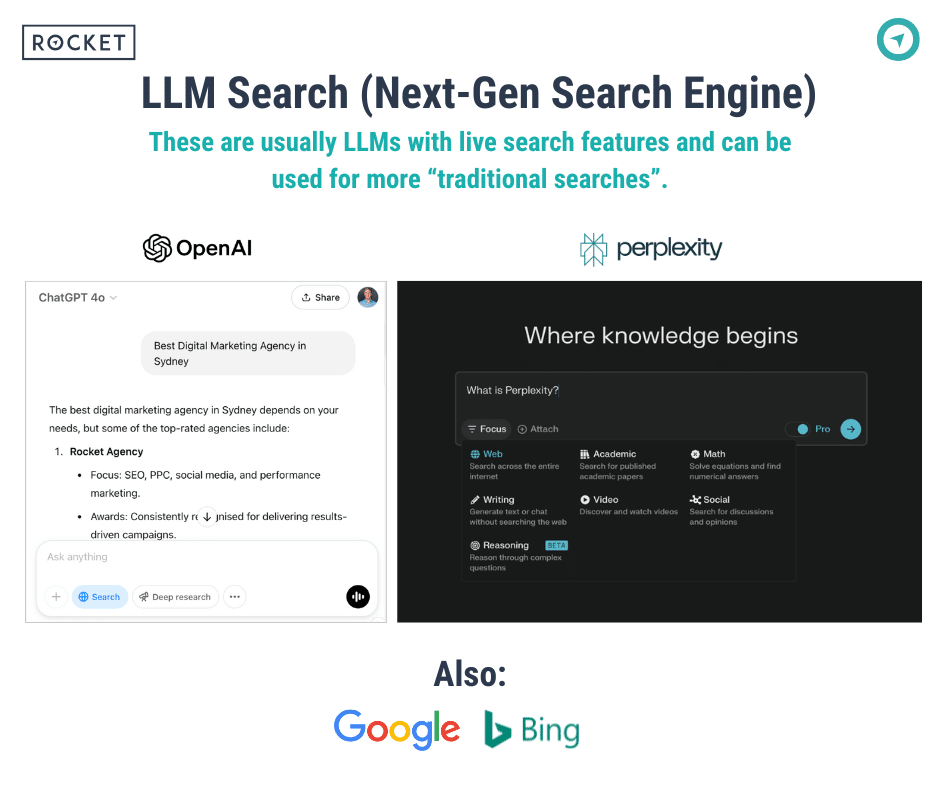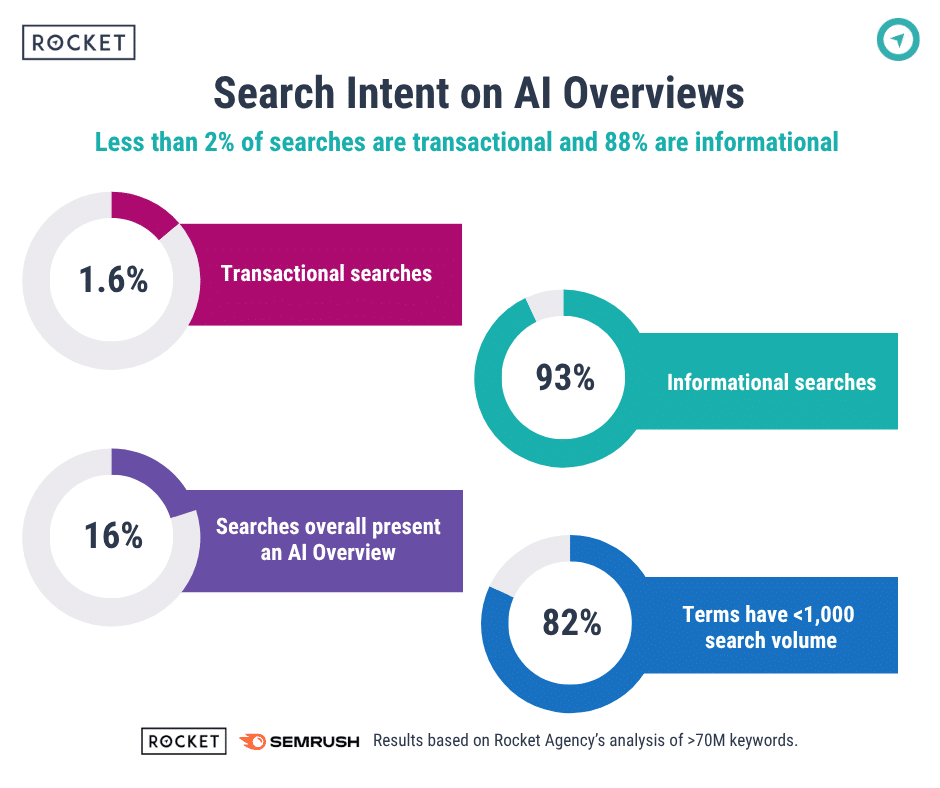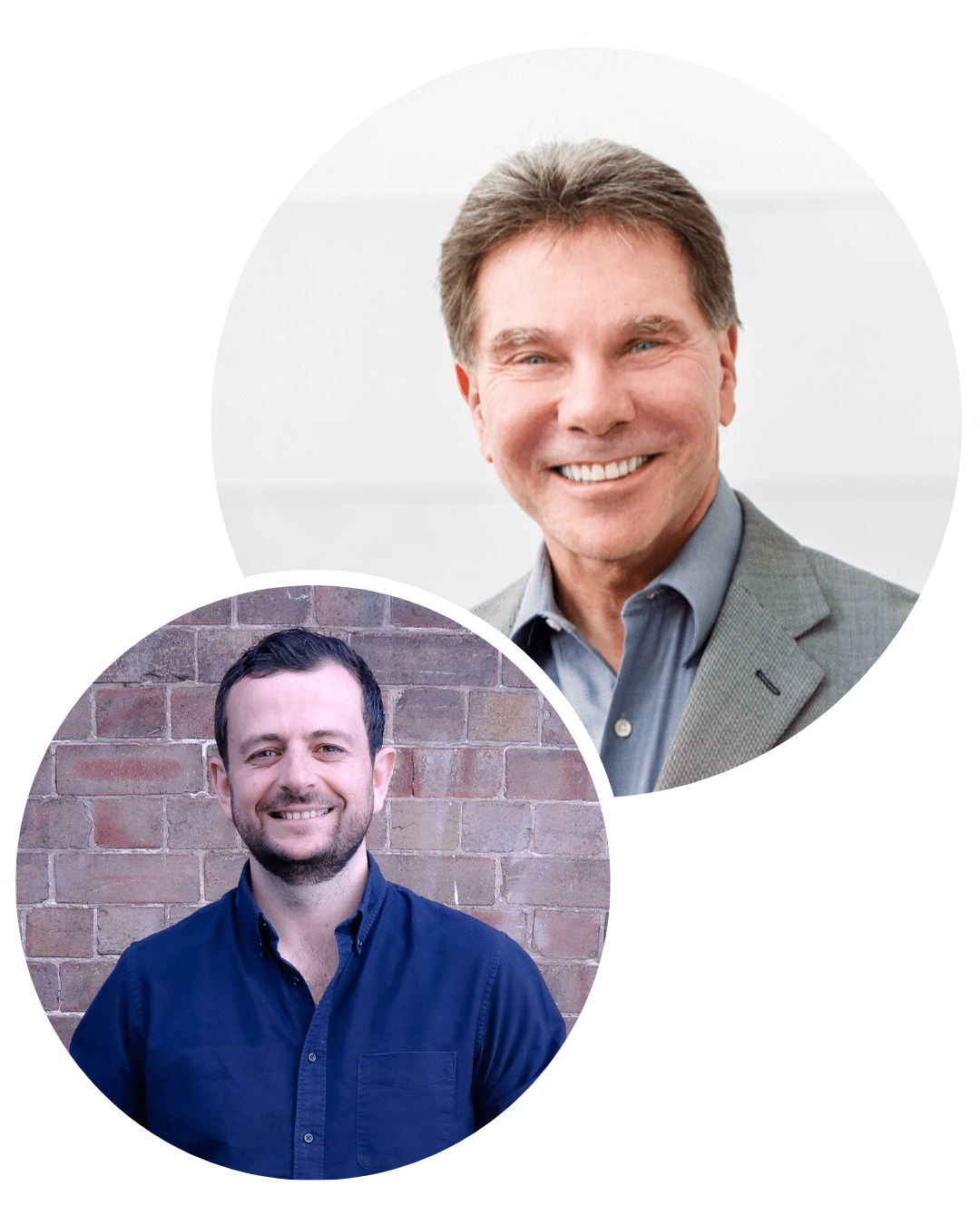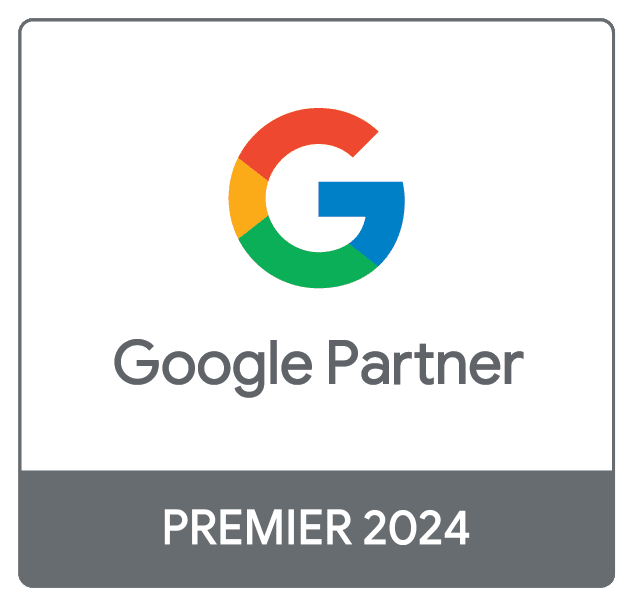The Future of Search in Australia: AI and SEO
At Rocket Agency, we recently analysed 70 million keywords, 50+ top Australian websites, and hundreds of thousands of search results to answer the question that marketers across the country are asking: what does the rise of AI mean for SEO and digital marketing in Australia?
As an agency that's won 30+ digital marketing awards, we wanted to share what we found alongside clear guidance on how marketers can adapt their SEO strategy to prepare for search in the age of AI and LLMs (large language models).
Note: Throughout this article, we use the term "AIO" (AI Optimisation) to describe SEO tactics that are designed to improve visibility inside LLMs like ChatGPT, Gemini and Perplexity.
AI and Search Landscape
As an SEO agency in Australia, it’s hard to overstate how quickly AI has gone from an emerging curiosity to a defining force in digital marketing. Since its public release in late 2022, ChatGPT has become the poster child for generative AI, hitting one million users in just five days and becoming a mainstream topic in boardrooms and media outlets across Australia.

But the conversation around AI and search has quickly become polarised. Headlines scream that "Google is Dead," and social media is flooded with hot takes predicting the end of traditional SEO. And yet, for most marketers, Google remains the #1 driver of website traffic, leads and revenue.
What we’re really seeing is an evolution in the way Australians search. In May 2025, AdNews reported a dip in Google Australia's ad revenue, coinciding with the introduction of AI-powered "Overviews" in search results. Around the same time, Google I/O revealed its broader AI roadmap, including features like AI snapshots, personalised agents, and multimodal experiences baked directly into the SERP.
These shifts have raised big questions: Is ChatGPT really killing Google? Is it still worth spending on SEO? How to optimise for LLMs? How will AI impact how users search? And what does all of this mean for brands that rely on search for growth?

Is Google really dead?
The answer, based on Rocket’s study of actual hard data is clear: The reports on the death of SEO are highly exaggerated.
SEO is evolving, not evaporating. Yes, generative AI is fundamentally changing how users search and engage with content. However, Google’s core strength, which is surfacing high-quality, relevant information, remains central to how most Australians discover products, services, and solutions. The fundamentals of search have not changed.
AI Impact on SEO and Digital Marketing
Google isn’t dead - the data doesn’t match the hype.
Despite the noise in the headlines, the numbers tell a very different story.
Yes, ChatGPT and other AI tools are seeing explosive growth in usage and awareness. But when it comes to actual search behaviour, Google remains dominant and is in fact growing. New research from SparkToro shared that Google grew its search activity by 20% in 2024 alone and receives over 373x more searches than ChatGPT. The study revealed that Google processes roughly 14 billion searches per day, compared to just 37.5 million for ChatGPT.

Independent studies support this. A Search Engine Land article, citing a BrightEdge study, found that even under optimistic projections, ChatGPT is expected to reach just 1% of global search market share by the end of 2025. For marketers, it’s a timely reminder to look past the headlines - Google is still where the vast majority of search happens.
AI is here to stay
AI isn’t replacing Google - it’s creating a second ecosystem alongside it. That ecosystem matters, especially as users test new ways to get information. But Google’s position as the primary channel for discovery, evaluation and conversion remains unshaken.
At Rocket, we’re deeply invested in understanding how AI is shaping the future of digital marketing. For Rocket clients, the impact of AI search to date has been concentrated around blog content and informational queries. In contrast, high-value commercial and service-related pages continue to perform strongly, often unaffected or even improved by AI-assisted search visibility.
The reality is simple: AI has changed how people search. That won’t reverse. The best-performing brands are responding by staying agile, testing early, and implementing what works.
Overview of AI and SEO
AI Overviews are embedded directly within the Google Search results page. They are an advanced version of the Featured Snippet and 119 words on average. They summarise relevant information from web pages and return a snapshot answer, positioned above the traditional organic results with some links on the right hand side of the screen. These overviews are influenced by page content, technical SEO like structured data, authority signals and the user’s search intent.
1. Traditional LLMs (Generative AI)
Traditional LLMs such as ChatGPT, Gemini, Claude, and Grok are primarily suited for ideation and task support. These models are trained on massive datasets that include websites, articles, code repositories, and public data, enabling them to answer questions such as “What should I do in Japan?” or “Can you proofread this email?”.
However, their responses are based entirely on their training data, not real-time information. For example, ChatGPT’s default model was last updated in June 2024, meaning it doesn’t have access to current events or live search results unless explicitly connected to the web.

2. LLM Search Engines (Next-Gen Search)
LLM Search Engines combine language models with live web search, allowing them to deliver up-to-date answers instead of relying only on pre-trained data. These tools blend generative models with live data from search engines like Bing (ChatGPT, Perplexity) or Google (Gemini). They can answer questions with real-time context, often referencing top-ranking or trusted sites in their responses.
Platforms like Claude, which recently added live search capabilities, are increasingly being used for more complex queries, similar to how users interact with traditional search engines, but with the added benefit of summarised, conversational responses.

3. AI Overviews (Answer Engine)
AI Overviews are embedded directly within the Google Search results page. They are an advanced version of the Featured Snippet and 119 words on average. They summarise relevant information from web pages and return a snapshot answer, positioned above the traditional organic results with some links on the right hand side of the screen. These overviews are influenced by page content, technical SEO like structured data, authority signals and the user’s search intent.

The future - AI Mode and more
AI Mode is Google’s conversational search experience that’s launched in the US. It builds on AI Overviews by combining live web results with an interactive chat interface, allowing users to ask follow-up questions, refine their search, and explore answers in a more natural dialogue, similar to ChatGPT. Unlike traditional search, AI Mode is a standalone experience designed for deeper, more exploratory queries. This is expected to roll out in Australia in late 2025.
This aligns with Google’s broader vision of agentic search, where users can instruct the AI to complete tasks such as planning a trip or finding a product, rather than just returning links. Shopping, recommendations, and personalisation are already being embedded into these experiences. Microsoft is pursuing a similar path, investing heavily in multimodal, task-based search via Copilot and Perplexity (Source).

While some of these features are still in testing, the trajectory is clear. Search will become more interactive, personalised, and answer-led. Brands that embrace this shift now will have a serious advantage as AI becomes the front door to more digital experiences.
For marketers, this means your brand needs to be discoverable not just on page one, but in featured answers and within LLMs themselves.
How AI Search Works: A Simplified Workflow
What AI does to generate search results
Here's an overly simplified explanation of how AI search delivers search results:
Step 1: User enters a query into an AI tool like ChatGPT, Gemini or Perplexity
Step 2: The model determines whether to:
A. Answer from its pre-trained static dataset, or
B. Retrieve live results from the web via integrated search engines (e.g. Bing or Google)
Step 3: The LLM processes the information, favouring pages with strong authority, structure, and clarity
Step 4: It generates a natural language response, optionally including citations or references
Step 5: The result is delivered as a summary, with or without links, depending on platform behaviour

AI and SEO: What Does the Data Tell Us
Impact of AI Overviews on SEO in Australia
In our independent study at Rocket Agency (May 2025), we found that:
- 80% of the top 3 preview links in AI Overviews overlap with the top 10 organic results on the Google SERP.
- 52% of all links included in AI Overviews are in the top 10 organic results of the Google SERP

We also know that:
- 12% of all Australian desktop searches now trigger an AI Overview
- Industries most affected include Health (48%), Science (30%), and People & Society (27%)

We analysed 70m keywords in AU to find out what type of searches display an AI overview. We found that:
- Less than 2% searches are transactional.
For e.g. “Buy shoes” or “SEO Services in Sydney”, whre money matters - More than 90% of queries with are low-intent and informational in nature
For e.g. “What is…” or “How do I paint a wall” where you can have an instant answer - 16% of all searches present an AI Overview
- 80% of search terms have less than 1000 search volume
This means that the user is typically asking for something specific using long-tail keywords.

We’ve observed that across Rocket client accounts, the impact of AI on search results is real, but highly dependent on industry, query type, and user intent. This is based on accurate data on Rocket Agency client data from Q1 2025.
- 35% average drop in CTR for Top 10 search results
- 20% average drop in CTR if you rank on Position #1 for a keyword
- 8% - 20% drop in clicks as a result of AI Overviews

Impact of LLM Search Engines on SEO
Semrush Study | SearchGPT vs Traditional Search
A 2024 Semrush study found that:
- 70% of LLM queries are not traditional search queries. They're prompts to write, summarise, or explain (e.g. "write an email," "check grammar," "summarise this research")
- LLMs disproportionately favour large, well-known brands that are referenced frequently across the web. LLMs are not crawling the web with the same breadth as Google. They’re cherry-picking trusted sources and often referencing just a few domains per query. This gives bigger brands an edge, for now.

- Search results on SearchGPT overlap with Bing and Google.

Independent Research - Impact of AI on Organic Traffic
In our independent study at Rocket Agency (May 2025), we found that he impact of AI on organic traffic varies widely depending on the type of content and industry. For large, content-heavy websites - especially in categories like health, education, and software - users were turning to LLMs for answers. Top sites like Men’s Health and HubSpot saw declines of up to 80%, particularly on blog and informational pages.
We reviewed organic website traffic across Rocket’s entire client portfolio, which covers businesses from a broad range of industries including B2B, Ecommerce, SaaS. The results may surprise many, given the extreme headlines and ‘death of SEO’ posts on LinkedIn. Over a 3-month period in 2025 across all our clients (including clients that don’t have an SEO retainer with Rocket), we saw:
- 13.8% increase in organic traffic YoY
- 0.6% average AI-driven traffic
- 0.3% median AI-driven traffic
Out of all our clients, the highest AI-driven traffic was 3% for a single business, where the company provided a B2B service. 97% of their organic traffic was driven by Google and other traditional search channels.

Traditional SEO still dominates for maps, local, and shopping-related searches because of limited functionality of ChatGPT and other LLMs. When traffic shifts to AI, it’s typically blogs and articles targeting long-tail questions that are affected. Core commercial and service pages remain largely unaffected and in some cases, are benefiting from increased visibility where AI Overviews reference their content.
Share of AI Traffic by Tool
There is no reliable metadata study on this topic in Australia. Based on Rocket’s independent client Google Analytics data from Q125, we know that about 70% of the AI search traffic is driven by ChatGPT, followed by Perplexity at 19% and Gemini at 6.7%.

Key Takeaways
- There is a high overlap between AIo and traditional SEO. LLMs use Google and Bing. If you rank well on Google, you are likely to rank well on LLMs.
- Brand and specialisation is crucial for businesses. Focus on increasing the brand awareness across the web vs driving traffic to a specific page.
- LLMs are currently limited in their functionality and provide inconsistent results. There are no direct tools like Google Analytics for SEO to measure AI search performance. Things are changing fast and are still in the testing phase.
- The impact of AI on search is currently small for most businesses. Traditional SEO is still king. Most AI search tools impact informational searches. Your SEO strategy does not have to change drastically.
6 Ways on How to Rank on ChatGPT and Other LLMs (AIO)
Ranking on ChatGPT, AI Overviews and more
1. Do good SEO
Strong SEO fundamentals are still the foundation for good AI Search Optimisation. This ultimately provides the best result for the user.
2. Optimise technical for LLMs
- Don’t block LLMs in your robots.txt
- Create and maintain an llm.txt file
- Pre-render JS-heavy pages so LLMs can crawl them easily
- Check your Bing/Goole webmaster tools
- Use structured data (especially for shopping or reviews)
3. Content is still king
- Prioritise E-E-A-T: Experience, Expertise, Authoritativeness, Trustworthiness
- Be the expert in your space
- Publish proprietary or unique data
- Answer questions directly and clearly on both, a page and paragraph level
- Keep content fresh and updated
4. Structure content
- Use logical semantic HTML (headers, bullets, tables)
- Use semantic and descriptive URLs and page titles
- Optimise meta titles and descriptions
- Include summaries, FAQs and listicles
- Mark up articles with schema
- Ensure each section can stand alone and make sense
5. Build brand authority online
- Secure brand mentions (Digital PR, reviews, forums)
- Ensure you are listed on key directories
- Cultivate genuine reviews across the web
- Engage in online communities
- Optimise for other web entities beyond your site
6. Monitor and Adapt
- Set up an AI filter within Google Analytics 4
- Consider using third-party AIO monitoring tools
- Monitor the impact of AI Search on your business
- Stay informed with trusted updates
Final Thoughts
AI is changing how people search, but it hasn’t replaced Google, and it likely won’t anytime soon. Search volumes are growing across both traditional engines and LLMs, which means the opportunity is bigger, not smaller. What we’re seeing is that great SEO and great AIO share the same foundation: technically sound websites, content published using SEO copywriting best practices, strong domain authority and a clear understanding of user intent.
Your SEO strategy doesn’t need to be thrown out, it just needs to be tweaked. At Rocket, we’re not reacting with panic. We’re tracking the data, adapting where needed, and doubling down on what works. The agencies and brands that stay focused, while testing, learning, and refining, will come out ahead as search continues to evolve.
Want to get ahead of your competitors in AI Search? Get in touch with Rocket today!
About the Author

Joe is an award-winning SEO leader with a proven track record of scaling high-performing teams and delivering measurable results. Joe has driven organic growth for global brands like Amazon, Coca-Cola, ANZ, and Dulux through innovative strategies and data-driven insights. With over 20 industry award nominations - including Best SEO Agency APAC 2024 and Best SEO Campaign - Joe is recognised as a leader in the field. Passionate about building impactful teams and exploring the transformative role of AI in SEO, Joe brings a forward-thinking approach to digital marketing at Rocket Agency.









































